Related Research Articles

Athens is a township in the United Counties of Leeds and Grenville in Eastern Ontario, Canada. It is located approximately 25 kilometres (16 mi) north of the St. Lawrence River, near Brockville, west of Addison, and about 90 kilometres (56 mi) south west of Ottawa. Formerly, it was a part of Yonge township before becoming Rear of Yonge and Escott with Athens as its own census division and finally, Athens township. The township consists of the town of Athens and a few other small communities.
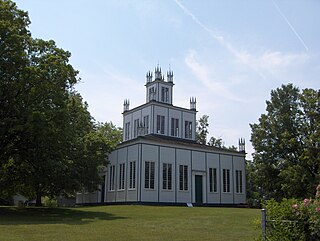
The Sharon Temple is an open-air museum site, located in the village of Sharon, Ontario, that was in 1990 designated as a National Historic Site of Canada. It is composed of eight distinctive heritage buildings and dwellings, and houses 6,000 artifacts on a 1.8 ha. site. The building is made available for public use such as tours, concerts, weddings, and special occasions by its current owner, the Sharon Temple Museum Society.
The Religious Society of Friends began as a proto-evangelical Christian movement in England in the mid-17th century in Lancashire. Members are informally known as Quakers, as they were said "to tremble in the way of the Lord". The movement in its early days faced strong opposition and persecution, but it continued to expand across the British Isles and then in the Americas and Africa.
The Friends World Committee for Consultation (FWCC) is a Quaker organisation that works to communicate between all parts of Quakerism. FWCC's world headquarters is in London. It has General Consultative NGO status with the Economic and Social Council of the United Nations since 2002. FWCC shares responsibility for the Quaker UN Office in Geneva and New York City with the American Friends Service Committee and Britain Yearly Meeting.

The Historical Diving Society (HDS) was formed in 1990 in the United Kingdom by a group of enthusiasts whose aim is to preserve and protect diving heritage. The society has since grown into an international organisation with affiliated national societies across the world. Active societies in North America, Europe and Australia collaborate and work together with the HDS towards the same goals.

Quakers are people who belong to a historically Protestant Christian set of denominations known formally as the Religious Society of Friends. Members of these movements are generally united by a belief in each human's ability to experience the light within or see "that of God in every one". Some profess a priesthood of all believers inspired by the First Epistle of Peter. They include those with evangelical, holiness, liberal, and traditional Quaker understandings of Christianity. There are also Nontheist Quakers, whose spiritual practice does not rely on the existence of God. To differing extents, the Friends avoid creeds and hierarchical structures. In 2017, there were approximately 377,557 adult Quakers, 49% of them in Africa.
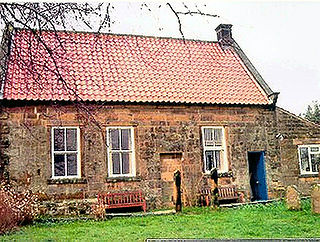
Osmotherley Friends Meeting House is a Friends Meeting House of the Religious Society of Friends (Quakers), situated in the village of Osmotherley in North Yorkshire, England. It is a Grade II listed building.
The Canadian Museums Association (CMA) is a national non-profit organization for the promotion of museums in Canada. It represents Canadian museum professionals both within Canada and internationally. As with most trade associations, it aims to improve the recognition, growth and stability of its constituency. Its staff supports their nearly 2,000 members with conferences, publications, and networking opportunities.

The John Freeman Walls Historic Site and Underground Railroad Museum is a 20-acre (81,000 m2) historical site located in Puce, now Lakeshore, Ontario, about 40 km east of Windsor. Today, many of the original buildings remain, and in 1985, the site was opened as an Underground Railroad museum. The site forms part of the African-Canadian Heritage Tour in Southern Ontario.
Elias Moore was a Loyalist politician in Upper Canada. Born into a Quaker family in New Jersey just after the American Revolution began, he and his family eventually emigrated to Upper Canada. He later became a member of the Legislative Assembly of Upper Canada, and he is notable for being one of the first Quakers to take an elected seat in Canada.

The Florida Historical Society is an organization that promotes the study of the history of Florida. Incorporated in 1856, the Society collects, preserves and publishes materials relating to the history of Florida and its denizens. After being reorganized in 2002, the Society began annual meetings to provide a forum for professional historians, and others interested in Florida History. It publishes the journal Florida Historical Quarterly, originally the Florida Historical Society Quarterly, an academic journal which releases new volumes four times a year, and manages the Library of Florida History.
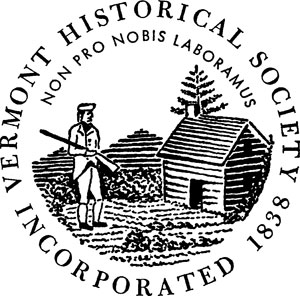
The Vermont Historical Society (VHS) was founded in 1838 to preserve and record the cultural history of the US state of Vermont. Headquartered in the old Spaulding School Building in Barre, the Vermont History Center is home to the Vermont Historical Society's administrative offices, the Leahy Library and a small book shop. In Montpelier the Society operates the Vermont History Museum in the Pavilion building, just east of the Vermont State House.
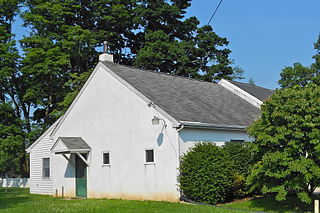
Ercildoun, population about 100, is an unincorporated community in East Fallowfield Township, Chester County, Pennsylvania, United States. The hamlet was founded by Quakers and was an early center of the abolitionist movement. In 1985 the entire hamlet, including 31 properties, was listed as a historic district on the National Register of Historic Places. Of these properties two were vacant land, 14 were significant buildings, ten were contributing buildings, and five buildings, built in the 1950s, were non-contributing. The Lukens Pierce House, an octagon house listed separately on the U.S. National Register of Historic Places, is located about half a mile northwest of the hamlet. Ercildoun is one of about ten hamlets in the township, which has no cities or towns, but has 31 sites listed on the National Register. It is one of the larger hamlets, located near the center of the township, and historically among the best known. The city of Coatesville is about 3 miles north.

Lindley Murray Moore was an abolitionist, and educator.
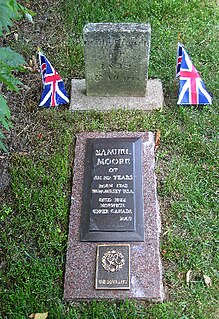
Samuel Moore (1742–1822) is notable as a leader in the early establishment of the Religious Society of Friends (Quakers) in Maritime Canada, and as the progenitor of a number of civic, religious and political leaders in both Canada and the United States.
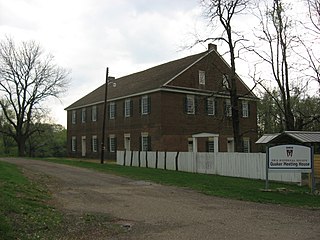
Friends Meetinghouse is a historic Quaker meeting house near OH 150 in the village of Mount Pleasant, Ohio. It was built in 1814 and added to the National Register of Historic Places in 1970 and was the first Quaker yearly meeting house west of the Alleghenies.
The Ontario Genealogical Society, operating as Ontario Ancestors since early 2019, is the largest organization devoted to research into family history in Ontario, Canada. Founded in 1961 as a Registered Charity corporation, the Society has grown by 2020 to include 30 local branches covering all of Ontario and five Special Interest Groups.
Timothy Rogers (1756–1834) was a Quaker settler. He is notable for founding Quaker settlements that eventually became Newmarket and Pickering in what is now Ontario, Canada.
Alma Gould Dale, "a legendary figure in Canada history," founded the first monthly Quaker meeting in western Canada, at Hartney, Manitoba, in 1899. She represents the Quaker presence in Canada on one of the seventy-five panels in the Quaker Tapestry at Friends' House, in London, where she is credited with a major role in the growth of Quakerism in Canada from 1800 on. On the tapestry, she is depicted driving a palomino team to a Quaker settlement in western Canada, which she drove in all weather. She was well known as a dynamic speaker and was invited to speak in Canada, England, and New Zealand.
The Progressive Friends, also known as the Congregational Friends and the Friends of Human Progress, was a loose-knit group of dissidents who left the Hicksite branch of the Society of Friends (Quakers) in the mid-nineteenth century. The separation was caused by the determination of some Quakers to participate in the social reform movements of the day despite efforts by leading Quaker bodies to dissuade them from mixing with non-Quakers. These reformers were drawn especially to organizations that opposed slavery, but also to those that campaigned for women's rights. The new organizations were structured according to congregationalist polity, a type of organization that gives a large degree of autonomy to local congregations. They were organized on a local and regional basis without the presence of a national organization. They did not see themselves as creators of a new religious sect but of a reform movement that was open to people of all religious beliefs.
References
- ↑ "Our past can help shape our future: The Canadian Friends Historical Association". 23 February 2015.
- ↑ "Home". cfha.info.
- ↑ Maria Canton, Quakers here to explore link to Underground Railroad, Owen Sound Sun Times, Monday, September 22, 2008
- ↑ "Canada Revenue Agency/Agence du revenu du Canada". 27 November 2019.
- ↑ "CFHA Transcriptions". cfha.info. Archived from the original on 2015-02-04.
- ↑ http://freepages.genealogy.rootsweb.ancestry.com/~saylormowbray/quakbooks.html [ user-generated source ]